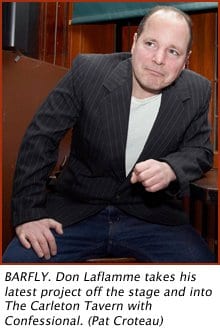“A play is supposed to move you, one way or another. That’s its job.”
Don Laflamme takes a sip of his beer and leans back in his chair. He nods pointedly, as if to say, “it’s that simple.”
We’re sitting in a local bar together with director Lisa Zanyk. Laflamme and Zanyk are the proud co-owners of the Ottawa Chamber Theatre Company. Their company is small but it has attracted top local talent and so far sold out every single show. Both feel that one of the reasons they’ve had such support is their back to basics approach to theatre — Laflamme and Zanyk have stuck to what they know, choosing plays that are relevant to their neighbourhood and community.
For Laflamme, home is Hintonburg, the historic neighbourhood just west of downtown. Their last play was held at Cube, an edgy art gallery in the heart of the community. But Laflamme held even tighter to his roots for this upcoming production. It’s being held in a bar, the infamous Carleton Tavern.
“I am a third generation resident. The characters in this play reminded me of a lot of people I’ve seen in both Mechanicsville and Hintonburg. I feel that this beloved tavern is an excellent venue for the play as it’s alive with similar colourful, fun-loving characters.”
Laflamme gestures to the front of the bar where the play will be held. He’s interrupted by a middle-aged man, who introduces himself as the “neighbourhood alcoholic” and, swaying as he speaks, enquires about the upcoming theatre production. The friendly interruption is brief before the man leaves on his way, concentrating hard as he weaves through the tables.
Laflamme smiles and continues.
He calls the process “organic” and “playful,” allowing the lines between the actors and audience to blur as the bar becomes the setting for Confessional.
“I have been very much inspired by a southern writer named Larry Brown. He taught me to love the place I’m from, and that good stories could only ever be from what you know in your heart.”
Laflamme and Zanyk know a good story when they’ve found one. Confessional is an earlier version of Williams’ more popular Small Craft Warnings. The script is far from a polished finished work. Rather, it is a sketch.
Confessional takes place in a rundown bar on the Southern California coast, where a group of lonely and disparate individuals, rejected by “normal” society, come together in their need for human contact and escape. The play follows interactions and their confessions as one by one each tells his tale.
“This play is about loneliness; it’s sad but there’s also humour. It’s about our need for human companionship.”
Dated 1972, the play includes two young queers. Their interactions with each other and the main character, Leona (played by Mary Ellis) are troubled. Their confessions reveal the strain and guilt they carry. There is beauty and joy in the one, sadness and bitterness in the other. Laflamme feels this is a reflection of the playwright’s own struggles.
“It’s also about him — Tennessee Williams. That’s the really interesting part. It’s as if he’s written a part of himself in each character, expressing his pain and loneliness. It feels really honest.”
Williams (1911-1983), best known for A Streetcar Named Desire and The Glass Menagerie, was gay but often approached queer themes obliquely.
Laflamme balances the heavier content with a lighthearted attitude. He’s excited to share the work in such an unconventional setting.
“It’s fun to just let it rip in terms of the whole process. No need to be heady with this sort of theatre; it’s as straightforward as Hintonberg itself. In certain circles in this neighbourhood, it used to matter how tough you were. We were just kids, but some of those guys went on to keep fighting. I hope some of those guys drop by to see the play and have a few drinks after.”

 Why you can trust Xtra
Why you can trust Xtra


